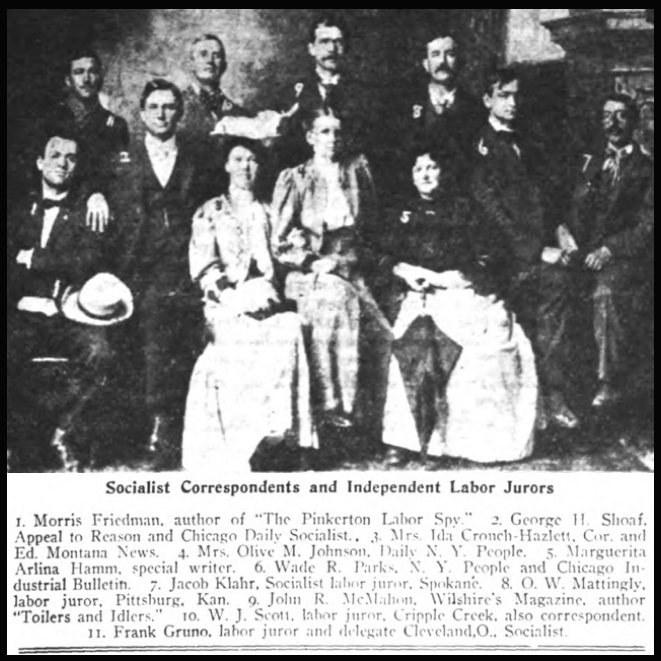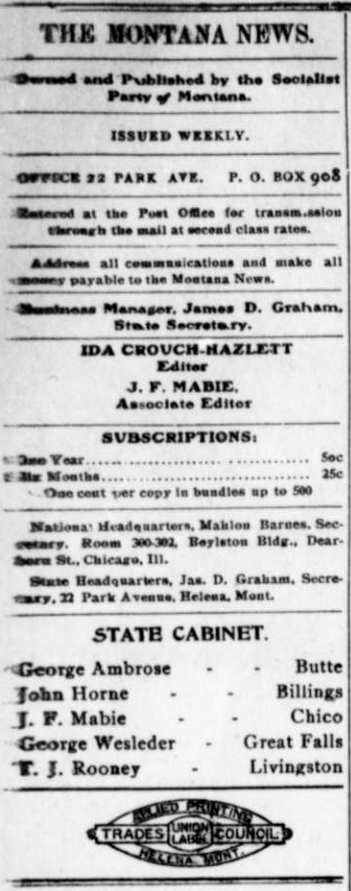powers of privilege will not go
to keep the workers in slavery.
-Mother Jones
Hellraisers Journal, Monday November 11, 1907
Rathdrum, Idaho – Socialist Editor Called to Testify at Adams Trial
The second trial of Steve Adams is proceeding in Rathdrum, Idaho, where Ida Crouch-Hazlett, editor of the Socialist Montana News was called to testify during the Adams trial and grilled on her Bible reading, speech making, etc., see below.
In Rathdrum, Mrs. Hazlett is the sole correspondent representing the American Socialist press. That situation was much different during the Haywood trial in Boise when the Socialist press was well represented, demonstrated by the photograph below from Wilshire’s Magazine of August 1907:
From the Montana News of November 7, 1907:
NEWS EDITOR ON WITNESS STAND
—–
Explains Socialist Party Methods to
the Court and JurySpecial Correspondence.
Rathdrum, Ida., Oct. 31.
One peculiar feature of the present prosecution of the Federation cases is the ferocious attacks Prosecuting Attorney Knight thinks he has to make on everything that smacks of socialism. And his zeal falls as flat as the echo of a last year’s bird’s nest. For instance, he asks every prospective juror if he ever belonged to any organization, opposed to government; and he says it in connection with other remarks in such a way as to show he is making a direct slap at the socialists. Nothing could be more malicious and unjust.
That socialists should be classed as opposed to government, is the height of ignorant bigotry , with the socialist ticket appearing on the official ballots at every election, under the direct protection of the government. Such unfair slurs do no credit to those who represent an opposing political organization. It is simply the persistence in a policy of poisoning the public against the socialists.
The defense has had to put up a big fight against Willes, the news paper man from Coeur d’Alenes City. It is evident to all that he is intensely prejudiced against the defendant and bis paper has been most vicious in publishing every lie and slander current against the Federation men. Still he evaded all questioning so cleverly that it took a peremptory challenge to get rid of him. It was proven that when Wade Parks was delivering a speech on the streets of Coeur d’Alenes city on the cost of the trials to the state of Idaho, that Willis had said, he ought to be driven out of town. When questioned as to why he made this remark be said the man was making a tirade against government, law and order and established society, and he said to a policeman that he ought not to be permitted to remain in town. He admitted that he had only heard the speaker for five minutes, and then got on his wheel and rode away. And yet this is the sort of an ignoramus that is poisoning the mind of the public against truth and science through the avenues of the capitalist press.
A goodly number of jurors are being excused because of prejudice against capital punishment and admitted prejudice in the case.
One question that Knight is steadily asking of each juror, is that if it should develop in the course of the trial that a contest between capital and labor is at stake, whether that would distract the mind from the real issues and crimes at stake. To a socialist this simply means that society is smothering the great crime of outrageous subordination and injustice the working class, under the superficial perversions that are the necessary results of such an abnormal system, and which the ruling class label crimes because they are a menace to their administration of the social structure. Hence any differences that may raise on the economic plane of a class nature must be minimized while petty disturbances are shoved to front.
Juror Doty was excused on a emptory challenge by the defense.
Oscar Baker, a harness maker from Rathdrum, is a socialist drawn on the venire. All his answers showed that he was perfectly fair, with no prejudices, and only wanted justice done. But the prosecution do not want any socialist on that jury, and when they could not get anything adverse against him, even by bringing in a government official, one of the men working for the prosecution against him, they dismissed him on a peremptory.
The formation of the jury is going much more slowly than was anticipated here.
—–
The prosecution in the Steve Adams’ case have insisted from the first in introducing Mrs. Hazlett as a factor in the case, asking every juror, as one of the test questions, aa to whether he has heard her, her influence him, the reading of her paper, and similar questions. Mr. Darrow finally made such vigorous objection to this as a foolish and unwarranted proceeding, challenging them with the falsehood of their tactics that the prosecution was forced to make good its position.
The contention was over an interview a reporter for the Spokesmen-Review had had with Mrs. Hazlett at the time she was arrested in Spokane in which it was stated in flaring headlines that she was coming to Rathdrum to educate the jurors in the Steve Adams case. Mrs. Hazlett denied that she had made any such assertion in any interview.
Thursday morning the Spokesman-Review bad its reporter there to prove its point. The reporter was young Harman. His father is a member of our party at Kalispell, but the young man has failed to walk in the ways of his ancestor, and is much opposed to socialism.
Mr. Knight put him on the stand and proceeded to hand him a copy of the Review containing the interview quoting Mrs. Hazlett. The reporter said that she had said that she was coming to Rathdrum to do propaganda, that the people there were all of capitalist mind and that there were two sides to a case. He admitted that he did not write the headlines, and that Mrs Hazlett did not say what the prosecution attorney had been putting into her mouth.
Mrs. Hazlett was then called to the stand. As she took her seat in the witness chair the judge remarked to her that he supposed she preferred to affirm, to which she assented.
The first question that Knight asked her was whether she read the Bible.
She said, “When?”
He replied, “Ordinarily.”
Mrs. H.: “You will have to specify.”
Then Knight asked her if she had ever read the passage, “Swear not at all.” She replied that she had.
What connection this was supposed to have with the case was not made evident.
In response to Mr. Darrow’s questions she said she had lived at Helena, Montana, that she was the editor of the Montana News, the official organ of the Socialist Party of Montana, was one of the workers in the national socialist movement, and had been employed by the party for about eight years; but besides her own she was reporting for some half a dozen socialist papers.
On being asked if she were a correspondent of the Appeal to Reason, she replied that she had not the honor of being a correspondent of the Ap peal to Reason. Mr. Knight asked her if she would consider it an honor and she replied, “I would not.”
She stated that in her interview with Mr. Harman, she referred solely to doing propaganda work for the socialist movement, had never intended to talk on the Adams case at all that Rathdrum was simply one of her points on the route from British Columbia to Helena, and that she did not discuss the Adams matter during her lectures in Rathdrum, the only reference she made being a denial of the Spokesman-Review report, and the statement that she thought as fair a trial would be obtained in Rathdrum as anywhere in the state.
Mr. Darrow asked her if she had ever been employed in any capacity on the Federation cases. She replied that she had not, except in the capacity of a reporter on the socialist papers. She said that the only reason the socialist party was interested in these cases was as a feature in the class struggle.
On Mr. Knight’s cross examination he stated that he was a socialist and wanted to know which faction of the socialist party she represented.
She replied, “You mean, you think you are,” to the great hilarity of the courtroom. She then went on to say that there was only one socialist party and when asked in regard to its membership explained the method of admission to the party.
As she was about to leave the stand, Mr. Knight read from the paper, and asked her if she said she had civilized the Spokane court. She replied in the affirmative, and wanted to make an explanation of the circumstances. Knight resisted this but Darrow insisted and the judge signified his desire to hear what she had to say. She then related the actions of the bailiff, the appeal from Hinkle to Judge Hyde, and the protection which the latter had given her in her legal rights.
After the hearing, Judge Woods said he would allow a brief allusion to Mrs. Hazlett if the prosecution desired.
Knight rings in the old questions once in a while, but they fall flat since the lack of a basis has been exposed and the prosecuting attorney makes the usual ninny of himself by not knowing when he has enough, and dropping a plan of action that only adds to the good impression the defense is making.
Mr. Van Hasteen, one of the most active socialists in the community, was called to the stand, and testified that Mrs. Hazlett in no way discussed the Adams case during her lectures except to say that she believed as fair a trial could be had in Rathdrum as anywhere.
After court was dismissed at noon, Knight made an additional burro of himself. He had made the announcement to jurors that the socialists were holding secret meetings in reference to Adams’ case. As the spectators were passing out Com. Van Hasteen stepped up to him and told him he was mistaken. The statement was manifestly absurd as the local at Rathdrum is very weak, as in most country places. Knight flew into a panic and in a loud voice repudiated the right of any person to call him to account for what he had said in court, and shouted to the judge for protection, like a lost kid calling after his mammy. Everybody, including the judge, laughed at the ridiculous figure he cut. He said no one had any right to call him to account for what he had said in court. The judge said court wasn’t in session and he had nothing to do with it.
Knight evidently thinks he’s God and if his sacred dictum goes forth, it is immune.
Ida Crouch-Hazlett
SOURCE
Montana News
(Helena, Montana)
-Nov 7, 1907
http://chroniclingamerica.loc.gov/lccn/sn84024811/1907-11-07/ed-1/seq-1/
http://chroniclingamerica.loc.gov/lccn/sn84024811/1907-11-07/ed-1/seq-2/
http://chroniclingamerica.loc.gov/lccn/sn84024811/1907-11-07/ed-1/seq-3/
IMAGE
Wilshire’s Magazine
(New York, New York)
-Jan 1907-Dec 1909
https://catalog.hathitrust.org/Record/100696755
Wilshire’s of Aug 1907
https://babel.hathitrust.org/cgi/pt?id=iau.31858037309105;view=2up;seq=190
“Socialist Correspondents and Independent Labor Jurors”
-of the Boise Haywood Trial
https://babel.hathitrust.org/cgi/pt?id=iau.31858037309105;view=2up;seq=196



